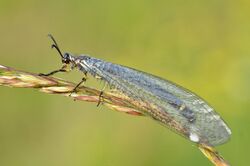Biology:Myrmeleon formicarius
| Myrmeleon formicarius | |
|---|---|

| |
| Scientific classification | |
| Domain: | Eukaryota |
| Kingdom: | Animalia |
| Phylum: | Arthropoda |
| Class: | Insecta |
| Order: | Neuroptera |
| Family: | Myrmeleontidae |
| Genus: | Myrmeleon |
| Species: | M. formicarius
|
| Binomial name | |
| Myrmeleon formicarius Linnaeus, 1767
| |
Myrmeleon formicarius is a species of antlion native to Belgium and other parts of Europe.[1] It is known to be present in the Genk nature reserve Opglabbekerzavel in 2020, according to the species inventory prepared for the city by the ecological study/advice company Mieco-effect.[2]
According to the European Environment Agency, this species has not yet been assessed by the IUCN and as such lacks an official conservation threat status.[3] Despite there being little species-specific information available online, the Encyclopædia Britannica describes it as "the best known of the 65 described species" of antlions.[4]
It has been suggested that there is a great deal of confusion in the distinction of individuals between M. formicarius and Euroleon nostras.[5] The easiest hallmark of M. formicarius larvae is its largely black head, but this can easily be mis-seen due to fine humus/substrate particles clinging to their many head hairs. For adults, the lack of black flecks in their wing colours is an identifying feature.
A 2020 study by Wu et al., sequenced their mitochondrial genome and found that they are most closely related to Myrmeleon immanis, another antlion species.[6]
The common name of M. formicarius in Dutch is Zwartkopmierenleeuw, which translates to "Blackhead antlion".
References
- ↑ "Myrmeleon formicarius Linnaeus, 1767". https://www.gbif.org/species/2100670.
- ↑ "Mieco-effect, ecologisch advies- en studiebureau". http://www.miecoeffect.be/.
- ↑ "Myrmeleon formicarius - Linnaeus, 1767". https://eunis.eea.europa.eu/species/91765#threat_status.
- ↑ "Antlion | insect". https://www.britannica.com/animal/antlion.
- ↑ "Twee soorten mierenleeuwen" (in nl) (PDF). https://www.nlmieren.nl/websitepages/mierenleeuwen.pdf.
- ↑ Jieqin Wu; Shaozhen Wang; Xiaozhen Yang; Yajie Guo; Xiaoqian Weng; Songqing Wu (2020). "The complete mitochondrial genome of Myrmeleonformicarius (Neuroptera: Myrmeleontidae)". Mitochondrial DNA Part B 5:2: 1798-1799. doi:10.1080/23802359.2020.1750977. https://www.researchgate.net/publication/340585114_The_complete_mitochondrial_genome_of_Myrmeleon_formicarius_Neuroptera_Myrmeleontidae. Retrieved 2022-03-24.
Wikidata ☰ Q1126195 entry
 |

